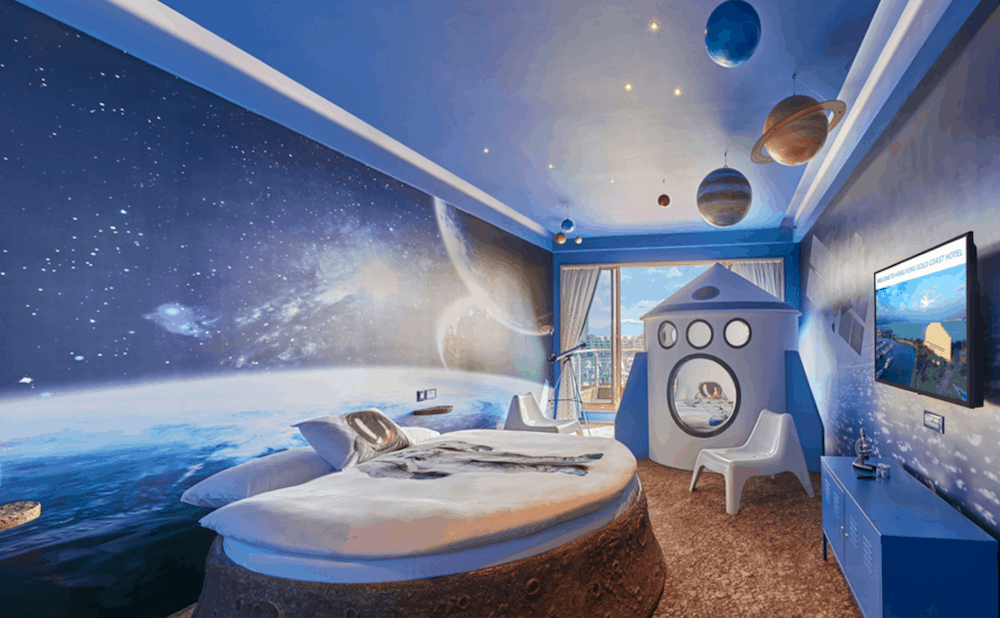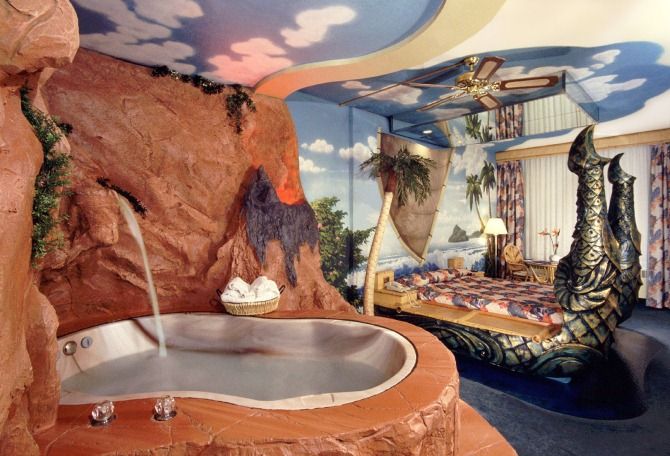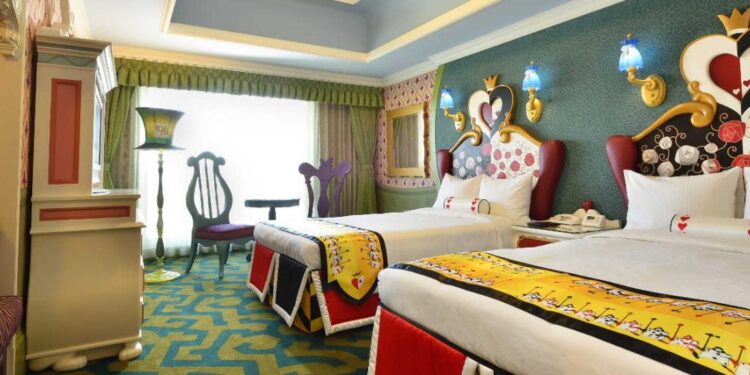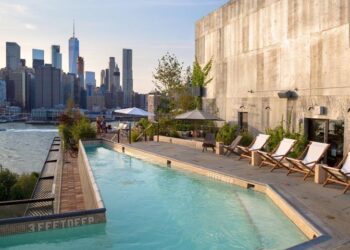Have you ever dreamed of sleeping in a castle, a space station, or a hobbit hole? Themed hotels offer an escape from the ordinary, transforming a simple overnight stay into an unforgettable adventure. These unique accommodations are a growing trend in the travel industry, catering to travelers who seek more than just a bed and a bathroom. They are a destination in themselves, designed to transport guests to another world, be it a fantasy realm, a historical era, or a sci-fi universe. This comprehensive guide will explore the fascinating world of themed hotels, delving into their appeal, what to expect, and how to find the perfect one for your next trip.
Why Themed Hotels are a Unique Travel Experience

A themed hotel is more than just a place to rest your head. It’s a meticulously crafted environment where every detail, from the decor and furniture to the staff’s costumes and even the menu, is designed to support a specific narrative or theme. This level of immersion creates a multi-sensory experience that standard hotels simply cannot replicate.
The appeal of themed hotels is multifaceted. For families, they turn a vacation into a magical story. For couples, they offer a romantic and memorable backdrop. For solo travelers, they provide an opportunity to indulge in a personal passion. The joy of a themed hotel comes from the complete suspension of disbelief. You’re not just a guest; you’re a participant in a grand story. This sense of play and escapism is a powerful draw in a world that often feels mundane.
Furthermore, the rise of social media has significantly fueled the popularity of themed hotels. These visually stunning environments are perfect for sharing on platforms like Instagram and TikTok, turning guests into brand ambassadors. The unique and often whimsical nature of these hotels makes them highly “shareable,” generating organic buzz and attracting a new wave of curious travelers.
A Look at Different Types of Themed Hotels
The variety of themed hotels is vast, with concepts limited only by imagination. They can be broadly categorized into several popular types, each offering a distinct experience.
A. Fantasy and Fairytale Themes: These hotels often draw inspiration from classic tales, epic sagas, or mythical worlds. Think castles complete with turrets and knights, rooms designed like a dragon’s lair, or whimsical cottages straight out of a storybook. These are particularly popular with families and those who love a touch of magic.
B. Historical and Cultural Themes: Step back in time with hotels that recreate a specific historical period or cultural setting. This could be a hotel styled as a Roman villa, a Wild West saloon, or a traditional Japanese ryokan. These accommodations offer a unique way to learn about and appreciate history in an immersive, tangible way.
C. Sci-Fi and Futuristic Themes: For fans of science fiction, these hotels are a dream come true. Imagine staying in a room that looks like a spaceship cabin, with glowing panels and futuristic furniture. Some hotels even incorporate advanced technology, such as automated check-ins and robotic assistants, to enhance the futuristic feel.
D. Adventure and Nature Themes: These hotels bring the great outdoors inside. From rooms designed to look like a treehouse canopy to hotels built to resemble an underwater world, they cater to those with a love for nature and adventure. Some even have a simulated “night sky” or special sound effects to create a truly immersive natural environment.
E. Pop Culture and Media Themes: These hotels are dedicated to a specific movie, book series, video game, or TV show. Examples include a hotel themed after a famous wizarding world, a comic book universe, or a beloved animated film. They allow fans to literally step into the world of their favorite stories.
F. Luxury and Art Themes: Beyond the obvious narratives, some hotels are themed around high-concept art, design, or a specific luxury experience. These could be hotels where every room is a unique art installation, or those that focus on a minimalist or avant-garde aesthetic, offering a stylish and sophisticated retreat.
How Themed Hotels Create an Immersive Experience
The magic of a themed hotel lies in the details. The complete immersion is a result of meticulous planning and execution across various elements.
A. Design and Architecture: This is the most visible aspect. The exterior and interior architecture are crucial. A castle-themed hotel will have stonework, battlements, and grand halls, while a space-themed hotel will use sleek, metallic materials and ambient lighting. The layout itself guides the guest through the experience.
B. Interior Decor and Furnishings: Every piece of furniture, artwork, and decor item is carefully chosen to fit the theme. A Roman villa room might have marble columns and fresco paintings, while a pirate-themed room could have a ship’s wheel and treasure chests for storage. This attention to detail ensures consistency and believability.
C. Sound and Lighting: The use of light and sound is a powerful tool for immersion. Low, flickering candlelight in a haunted mansion theme, or soft, glowing panels in a spaceship theme, can dramatically alter the atmosphere. Similarly, a custom soundtrack or ambient sounds (like waves for an underwater theme) can transport guests.
D. Guest Services and Staff: The staff often play a role in the narrative. They might wear costumes that fit the theme and are trained to interact with guests in a way that reinforces the experience. For instance, staff at a fairytale hotel might greet guests as “Lords” and “Ladies,” adding to the fun.
E. Food and Beverage: The dining experience is often part of the theme. A medieval-themed hotel might serve a banquet with period-appropriate food and drink, while a futuristic hotel could offer molecular gastronomy. This extends the experience beyond the room and into the culinary world.
F. Activities and Entertainment: Many themed hotels offer related activities. This could be a scavenger hunt for “treasure” in a pirate hotel, a tea party with fairytale characters, or a virtual reality experience in a sci-fi hotel. These activities provide an interactive element that deepens the immersion.
How to Find the Perfect Themed Hotel

Finding the ideal themed hotel requires a bit more research than booking a standard room. Here’s how to navigate the process.
A. Search Engine Queries: Start with broad searches like “fantasy themed hotels” or “unique themed hotels.” As you narrow down your interests, you can become more specific, for example, “Harry Potter themed hotel rooms” or “Wild West hotel.”
B. Utilize Travel Blogs and Niche Websites: Many travel bloggers and specialized websites focus on unique accommodations. They often provide detailed reviews, photos, and personal recommendations that can be invaluable. Look for sites dedicated to “boutique hotels” or “quirky stays.”
C. Check Social Media: Social media platforms like Instagram and Pinterest are visual goldmines. Search for hashtags like #themedhotel, #uniquestays, or specific themes like #piratehotel. This can help you discover hidden gems and see real-life photos from other travelers.
D. Read Guest Reviews: Once you’ve found a potential hotel, read reviews carefully. Look for comments specifically about the themed experience. Did guests feel the theme was well-executed? Were the details convincing? This feedback is crucial for managing your expectations.
E. Contact the Hotel Directly: For a truly immersive experience, it’s worth calling the hotel to ask about the theme’s specifics. Inquire about the different room types, available activities, and what makes their theme unique. This direct contact can also help you secure the best room for your needs.
F. Consider the Target Audience: Be mindful of who the hotel is designed for. Some themed hotels are family-oriented, with bright colors and child-friendly activities. Others are more geared towards adults, offering a romantic or luxurious take on a theme. Choose a hotel that aligns with your travel companions and desired atmosphere.
Preparing for Your Themed Hotel Stay
Once you’ve booked your themed adventure, a little preparation can enhance your experience.
A. Embrace the Theme: The best way to enjoy a themed hotel is to fully embrace it. Consider packing clothes or accessories that fit the theme. For a historical hotel, a period-inspired outfit could add to the fun. For a sci-fi hotel, a futuristic-looking accessory might be a cool addition.
B. Manage Expectations: While a great themed hotel strives for perfection, remember that it’s still a hotel. There might be modern conveniences (like a smart TV or a mini-fridge) that don’t perfectly fit the theme. Be prepared for these small breaks in immersion. The goal is to have fun, not to find flaws.
C. Check for Special Packages: Many themed hotels offer special packages that include dining experiences, tickets to local attractions, or themed activities. Look into these to get the most value and a more complete experience.
D. Plan Your Photo Ops: Themed hotels are perfect for photography. Think about the shots you want to get and the best times of day for lighting. This will help you capture memories and create shareable content.
The Future of Themed Accommodations
The trend of themed hotels is evolving rapidly. We are seeing a move towards more personalized and highly immersive experiences. The future of this industry will likely be shaped by several key factors.
First, technology will play an even bigger role. We can expect more hotels to incorporate virtual and augmented reality to enhance their themes. Imagine a room where the view from the “window” can change from a deep space vista to a bustling medieval marketplace at the touch of a button.
Second, there is a growing demand for sustainability and local integration. Future themed hotels might focus on themes related to eco-friendliness or local folklore, integrating the surrounding community and environment into the hotel’s story.
Third, we will likely see more collaborations between hotel chains and major entertainment franchises. This could lead to officially licensed hotels based on blockbusters and popular video games, offering a truly authentic experience for fans.
Finally, the concept of a “themed stay” could extend beyond the hotel room itself. Themed experiences might become an entire journey, from a themed shuttle from the airport to guided themed tours of the local area. The focus will be on creating a continuous, seamless narrative from the moment the guest’s trip begins.
Conclusion
Themed hotels are a testament to the fact that travel is about more than just the destination; it’s about the journey and the story you create along the way. They offer a powerful antidote to the impersonal and standardized nature of traditional travel, providing a canvas for imagination, creativity, and wonder. From a child’s first time sleeping in a castle to a couple’s romantic retreat in a historical villa, these accommodations create experiences that are not only memorable but also deeply personal.
Choosing a themed hotel is an invitation to step outside your everyday life and into a world of fantasy, history, or adventure. It encourages us to rediscover our sense of play and to see the world with a fresh, imaginative perspective. As the travel industry continues to evolve, these unique stays will undoubtedly continue to captivate and inspire a new generation of travelers who are no longer content with just a room, but are seeking a story to be a part of. The future of travel is not just about where you go, but about the unique worlds you can inhabit along the way. So, next time you plan a trip, consider leaving the ordinary behind and embarking on a truly immersive, themed adventure. The only limit is your imagination.









Discussion about this post